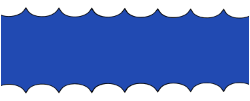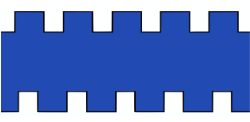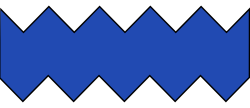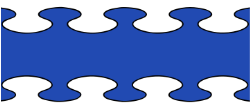Symbolism of Heraldry
The meaning of colours and images on surname coats of arms (family crests) and shields
A listing with their meaning for some of the most commonly used images used in heraldry, appearing on surname coats of arms (or family crests), shields and crests (the smaller image above the helmet on a coat of arms), along with the heraldic colours (or tinctures) used.
Also see: What is a Coat of Arms?
This Page (1): Heraldic colours (tinctures), shields and ordinaries, heraldic lines used on shields and coats of arms (family crests).
Page 2: Heraldic symbolism used on shields, coats of arms (or family crests) and images.
Heraldry Tinctures (Colours) & Their Meaning
The two metallic colours are:
Silver (or White) (Argent or ‘Ar.’) Meaning: Peace and sincerity.
Gold (Or) Meaning: Generosity and elevation of the mind.
The five tinctures (or colours) are:
Black (Sable or ‘Sa.’) Meaning: Constancy or grief.
Blue (Azure or ‘Az.’) Meaning: Truth and loyalty.
Green (Vert) Meaning: Hope, joy, and loyalty in love.
Red (Gules or ‘Gu.’) Meaning: Magnanimity, warrior or military strength, and martyr.
Purple (or ‘Purp.) Meaning: Royal majesty, sovereignty, and justice.
The word proper is used to mean something in its natural or normal colour, so an eagle proper would appear with brown feathers, and a lion proper would be in its natural tan or yellow-gold colour.
Those above are the main and normal tinctures, but occasionally a few other colours may be used, these are:
Orange (Tawny or Tenne) Meaning: Worthy ambition.
Maroon (Sanguine or Murray) Meaning: Fortitude or victorious.
Heraldic Ordinaries Used on Shields (Escutcheons) | Coats of Arms (Family Crests)
| Meaning | |
|---|---|
 |
A horizontal band through the middle of the shield. Military belt or girdle of honour – readiness to serve the public. |
 |
A horizontal wavy band through the middle of the shield. As fesse above but drawn like the waves of the sea. |
 |
A horizontal line through the middle of the shield. A shield divided per fesse. |
 |
A horizontal band along the top of the shield. Dominion and authority – often used to signify prudence and wisdom or command in war. |
 |
A V-shaped band inverted. Builders who have accomplished work of faithful service, a military insignia indicating rank or length of service. |
 |
A shield with the base area filled with an inverted V-shape. As a chevron above. |
 |
A diagonal band. A scarf or shield suspender of a knight commander – defence or protection. |
 |
A shield divided into two with a diagonal line. As a shield bend. |
 |
A cross expanding to the edges of the shield top to bottom and both sides. Faith, Christianity, service in the Crusades. |
 |
St. Andrew’s Cross expanding to all edges of the shield. Resolution. |
 |
A shield divided into four filled sections using two crossing lines as seen with a cross saltire. Resolution. |
 |
A vertical band centred from top to bottom of the shield. Military strength. |
 |
A shield divided equally in two with a vertical line. Pale: Military strength. |
 |
A shield divided equally into four or more pales of alternating tinctures. Military strength. |
 |
A shield with a V-shaped wedge from the top down to a point. Shaped wood used in building, also used on a pennon or flag. |
 |
A shield with a square normally in the upper dexter corner. Reward from the sovereign for performance of eminent service. |
 |
A shield divided quarterly with a horizontal and vertical line. Used to create four sections on a shield. Often used for double-barrelled surnames, with the first surname for the 1st and 4th quarters, and the second surname in the 2nd and 3rd quarters. |
 |
A shield divided into gyrons, known as gyronny (of eight or more sections). Unity. |
 |
A shield divided into squares of two tinctures. Constancy. |
 |
A shield divided into lozenge-(diamond) shapes of two tinctures. Honesty and constancy. |
 |
A shield with alternating variegated (bell) shapes. Also known as a fur. |
 |
A silver shield filled with ermine spots or marks. Used as a mark of dignity. |
Lines Used on Coats of Arms (Family Crest) Shields and Heraldic Images
 Engrailed (Meaning): Earth or land.
Engrailed (Meaning): Earth or land. Embattled (Meaning): Walls of a fortress or town.
Embattled (Meaning): Walls of a fortress or town. Dancettee (or Dancetty) (Meaning): Water.
Dancettee (or Dancetty) (Meaning): Water. Nebuly (or Nebulee) (Meaning): Clouds.
Nebuly (or Nebulee) (Meaning): Clouds. Raguly (Meaning): Difficulties encountered.
Raguly (Meaning): Difficulties encountered.